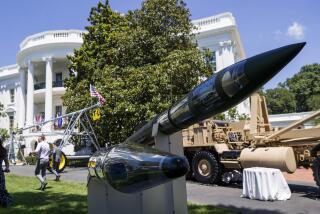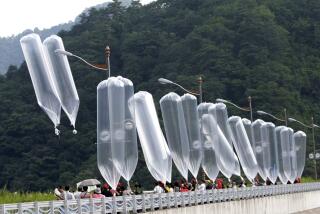U.S. May Send Patriot Missiles to Protect South Korea : Asia: The Clinton Administration seeks to send signal to the north.
- Share via
WASHINGTON — The Clinton Administration is considering sending Patriot anti-missile batteries to South Korea to strengthen U.S. forces there and help discourage any possible attacks by North Korea, officials here said Tuesday.
The move, which still requires a final decision by the President, was requested two weeks ago by Gen. Gary Luck, commander of U.S. forces in Korea, in the face of a continuing buildup of North Korean troops along the border.
Officials said that Defense Secretary Les Aspin has given preliminary approval to the proposal and that the Administration has begun sounding out key members of the House and Senate Armed Services committees on whether they would agree.
Although officials insisted that the move is not related to North Korea’s refusal to allow international inspectors to visit its nuclear facilities, deployment of the Patriots would be a visible symbol of U.S. resolve.
The anti-missile batteries, which were used during the Persian Gulf War to protect U.S. troops against attacks by Iraqi Scud missiles, would be deployed near key harbors or military airports and would be operated by U.S. crews.
It is not clear how much protection the batteries could provide, considering the multitude of potential targets and the limits of Patriot technology.
The Patriot’s performance has been a matter of some controversy. The weapon initially was given high marks by the military during the Persian Gulf War, but later assessments suggested that it was nowhere near as effective as it had been billed.
Officials now say that later versions of the missile have been far more accurate.
Officials said that initial conversations with key members of Congress have suggested that lawmakers generally would back the Administration if it chose to ship Patriots to South Korea.
The Administration has been under pressure to take a bolder stance in pressuring North Korea to comply with the Nuclear Non-Proliferation Treaty, and it clearly is hoping that granting Luck’s request will satisfy those critics.
Rep. John Murtha (D-Pa.), chairman of the House Appropriations defense subcommittee, recently called the threat of nuclear weapons development by Pyongyang the nation’s No. 1 security problem.
The CIA has said it believes that North Korea already has developed the technology to assemble a nuclear bomb and that it may have built one, possibly two.
It was not clear how many Patriot batteries ultimately would be sent to South Korea if President Clinton decides to proceed with the plan. Officials said that Luck had asked for two but that the Pentagon may decide to deploy more.
The batteries, designed to intercept and destroy incoming missiles in flight, presumably would be relocated from U.S. bases in Europe and transported by ship to South Korea--a process that could take as long as two or three weeks.
Officials stressed Tuesday that the plan to send the Patriots is “not an emergency” decision. “There is no effort to rush this,” a knowledgeable official said.
U.S. military strategists have become increasingly worried about the massing of forces by North Korea near the South Korean border over the last several years. North Korea is believed to have 750,000 troops within a few miles of the South Korean border. Recently, the North Koreans have begun shipping more tanks, artillery and advanced equipment into the area.
More to Read
Sign up for Essential California
The most important California stories and recommendations in your inbox every morning.
You may occasionally receive promotional content from the Los Angeles Times.










